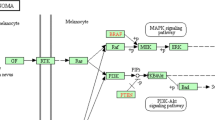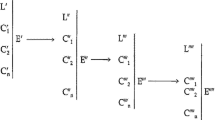Abstract
This paper advances the thesis of methodological mechanism, the claim that to be committed to mechanism is to adopt a certain methodological postulate, i.e. to look for causal pathways for the phenomena of interest. We argue that methodological mechanism incorporates a minimal account of understanding mechanisms, according to which a mechanism just is a causal pathway described in the language of theory. In order to argue for this position we discuss a central example of a biological mechanism, the mechanism of cell death, known as apoptosis. We argue that this example shows that our philosophically deflationary account is sufficient in order to have an illuminating account of mechanisms as the concept is used in biology.
Similar content being viewed by others
Notes
For a view along similar lines, consider this quotation from Brandon (1990, 185, emphasis added): “A causal/mechanical explanation is one that explains the phenomenon of interest in terms of the mechanisms that produced the phenomenon. What is a mechanism? … [T]his question has no general metaphysical answer, because the business of science is the discovery of mechanisms; so we cannot delimit in any a priori manner the mechanisms of nature. … The best we can do is to give an open-ended answer: a mechanism is any describable causal process”.
Let us also note here in passing that in the recent literature on mechanisms, mechanisms are very often regarded as specific kinds of systems. We think that this is misleading, since mechanisms and systems are different things: mechanisms on our view are causal pathways, and it is strange to call a causal pathway a ‘system’ (see also Oulis 2010).
For example, here is how Virchow in the nineteenth century describes necrosis in Cellular Pathology: “In necrosis we conceive the mortified [gangrenous] part to be preserved more or less in its external form” (quoted in Majno and Joris 1995, 3–4).
However, see Proskuryakov and Gabai (2010) for the argument that necrosis can in certain cases be considered as an active and well-regulated process.
References
Alberts B, Johnson A, Lewis J, Raff M, Roberts K, Walters P (2014) Molecular biology of the cell, 6th edn. Garland Science, New York
Bechtel W, Abrahamsen A (2005) Explanation: a mechanistic alternative. Stud Hist Philos Biol Biomed Sci 36:421–441
Brandon R (1990) Adaptation and environment. Princeton University Press, Princeton
Casini L (2016) Can interventions rescue Glennan’s mechanistic account of causality? Br J Philos Sci 67:1155–1183
Clarke PGH, Clarke S (1996) Nineteenth century research on naturally occurring cell death and related phenomena. Anat Embryol 193:81–99
Dowe P (2000) Physical causation. Cambridge University Press, Cambridge
Ellis HM, Horvitz HR (1986) Genetic control of programmed cell death in the nematode C. elegans. Cell 44:817–829
Fink SL, Cookson BT (2005) Apoptosis, pyroptosis, and necrosis: mechanistic description of dead and dying eukaryotic cells. Infect Immun 73:1907–1916
Glennan S (2002) Rethinking mechanistic explanation. Philos Sci 69:S342–S353
Glennan S (2017) The new mechanical philosophy. Oxford University Press, Oxford
Illari PM, Williamson J (2012) What is a mechanism? Thinking about mechanisms across the sciences. Eur J Philos Sci 2:119–135
Ioannidis S, Psillos S (2017) Mechanisms, counterfactuals and laws. In: Glennan S, Illari PM (eds) The Routledge handbook of mechanisms and mechanical philosophy. Routledge, New York, pp 144–156
Kanduc D, Mittelman A, Serpico R, Sinigaglia E, Sinha AA, Natale C, Santacroce R, Di Corcia MG, Lucchese A, Dini L, Pani P, Santacroce S, Simone S, Bucci R, Farber E (2002) Cell death: apoptosis versus necrosis. Int J Oncol 21:165–170
Kerr JFR (1971) Shrinkage necrosis: a distinct mode of cellular death. J Pathol 105:13–20
Kerr JFR (2002) History of the events leading to the formulation of the apoptosis concept. Toxicology 181–182:471–474
Kerr JFR, Wyllie AH, Currie AR (1972) Apoptosis: a basic biological phenomenon with wide-ranging implications in tissue kinetics. Br J Cancer 26:239–257
Lakhani S, Dilly S, Finlayson C et al (2009) Basic pathology: an introduction to the mechanisms of disease, 4th edn. Hodder Arnold, London
Levin S, Bucci TJ, Cohen SM, Fix AS, Hardisty JF, LeGrand EK, Maronpot RR, Trump BF (1999) The nomenclature of cell death: recommendations of an ad hoc committee of the society of toxicologic pathologists. Toxicol Pathol 27:484–490
Lockshin RA (2008) Early work on apoptosis, an interview with Richard Lockshin. Cell Death Differ 15:1091–1095
Lockshin RA (2016) Programmed cell death 50 (and beyond). Cell Death Differ 23:10–17
Lockshin RA, Williams CM (1964) Programmed cell death—II. Endocrine potentiation of the breakdown of the intersegmental muscles of silkmoths. J Insect Physiol 10:643–649
Lockshin RA, Zakeri Z (2001) Programmed cell death and apoptosis: origins of the theory. Nat Rev Mol Cell Biol 2:545–550
Machamer P, Darden L, Craver CF (2000) Thinking about mechanisms. Philos Sci 67:1–25
Mackie JL (1974) The cement of the universe. Clarendon Press, Oxford
Majno G, Joris I (1995) Apoptosis, oncosis, and necrosis. an overview of cell death. Am J Pathol 146:3–15
Oulis P (2010) Nature and main kinds of psychopathological mechanisms. Dialogues Philos Mental Neuro Sci 3:27–34
Proskuryakov SY, Gabai VL (2010) Mechanisms of tumor cell necrosis. Curr Pharm Des 16:56–68
Psillos S (2004) A glimpse of the secret connexion: harmonising mechanisms with counterfactuals. Perspect Sci 12:288–319
Rang HP, Ritter JM, Flower RJ, Henderson G (2016) Rang & Dale’s pharmacology, 8th edn. Churchill Livingstone, London
Salmon W (1984) Scientific explanation and the causal structure of the world. Princeton University Press, Princeton
Salmon W (1997) Causality and explanation: a reply to two critiques. Philos Sci 64:461–477
Saunders JW Jr (1966) Death in embryonic systems. Science 154:604–612
Shiozaki ΕΝ, Shi Y (2004) Caspases, IAPs and Smac/DIABLO: mechanisms from structural biology. Trends Biochem Sci 39:486–494
Slack JMW (2005) Essential developmental biology, 3rd edn. Wiley-Blackwell, London
Sloviter RS (2002) Apoptosis: a guide for the perplexed. Trends Pharmacol Sci 23:19–24
Wolpert L, Beddington R, Jessell T, Lawrence P, Meyerowitz E, Smith J (2002) Principles of development, 2nd edn. Oxford University Press, Oxford
Woodger JH (1929) Biological principles: a critical study. Routledge and Kegan Paul, London
Woodward J (2002) What is a mechanism? A counterfactual account. Philos Sci 69:S366–S377
Acknowledgements
We wish to thank the audience of the ‘Mechanisms in Medicine’ workshop (Centre of Reasoning, University of Kent, UK), where a previous version of this paper was presented, for their valuable feedback.
Author information
Authors and Affiliations
Corresponding author
Rights and permissions
About this article
Cite this article
Ioannidis, S., Psillos, S. In Defense of Methodological Mechanism: The Case of Apoptosis. Axiomathes 27, 601–619 (2017). https://doi.org/10.1007/s10516-017-9354-2
Received:
Accepted:
Published:
Issue Date:
DOI: https://doi.org/10.1007/s10516-017-9354-2




